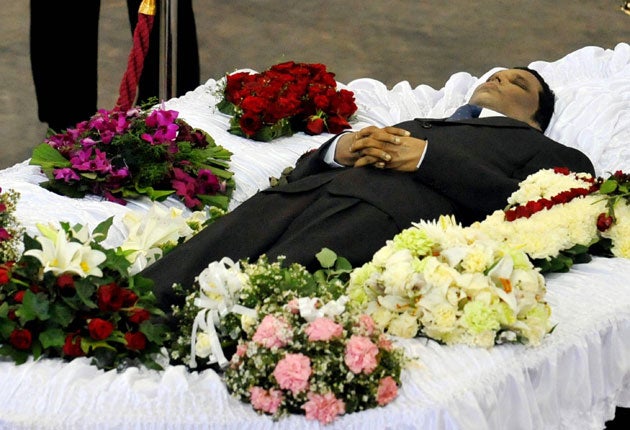Sri Lankan army 'victory' is marred by editor's killing
Journalist accuses government of murdering him in posthumous essay

In what would mark a major victory for the Sri Lankan government, the army last night claimed to have captured the country's entire northern peninsula, the cultural heartland of the Tamil Tiger rebels.
The announcement by the military that it had captured the Jaffna peninsula came as the fallout deepened over the murder of a newspaper editor who had spoken out against the government. Jurgen Weerth, the German ambassador, was called before the country's Foreign Ministry, which expressed its displeasure at a speech he had delivered the previous day as editor Lasantha Wickrematunga was buried amid tight security.
"Today is a day when one remains speechless," Mr Weerth, the most senior foreign envoy in the country, had said. "Maybe we should have spoken before this. Today it is too late. Today is a day when humanity has lost a major voice of truth."
The Jaffna peninsula has long been considered the heart of the separatist movement, and taking the peninsula after it being in the Tigers' hands for nine years will be a major military and strategic boost for the army.
A military spokesman, Brigadier Udaya Nanayakkara, said all of Jaffna was secured when soldiers captured Chundikkulam village. Last week they captured the Elephant Pass base, the insurgents' final stronghold on the peninsula. The development, if true, means that the Tigers now have just one last stronghold, centred on the district of Mullaittivu.
Mr Wickrematunga, editor of The Sunday Leader, was an outspoken critic of the government and the country's President, Mahinda Rajapakse. While he also criticised the Tigers, he said – in a cricketing analogy – there was little point "bowling at the fielding side".
The editor, who was shot at close range near Colombo as he drove to work a week ago, certainly knew he was in danger. In a remarkable essay published posthumously by his newspaper after his death, Mr Wickrematunga blamed the government.
"People often ask me why I take such risks and tell me it is a matter of time before I am bumped off," he wrote. "Of course I know that: it is inevitable. But if we do not speak out now, there will be no one left to speak for those who cannot."
He added: "As for me, I have the satisfaction of knowing that I walked tall and bowed to no man... Fellow journalists in other branches of the media walked with me: most are now dead, imprisoned without trial or exiled."
Attacks on journalists in Sri Lanka have been commonplace. In his eulogy to Mr Wickrematunga, the German ambassador suggested foreign diplomats should have done more. Two days before the editor was shot, unidentified attackers set fire to the Maharajah television network.
Referring to the killings of journalists, a spokesman for the German Foreign Ministry in Berlin last night said of Mr Weerth's eulogy: "The speech was delivered in the name of the entire diplomatic corps and it was an adequate sign of solidarity."
Mr Weerth was apparently summoned to the Foreign Ministry on Tuesday, where Foreign Secretary Palitha Kohona expressed Sri Lanka's displeasure over his remarks. The government has denied any involvement, while the opposition has demanded an international investigation.
In recent days, aid organisations have warned of the humanitarian disaster unfolding in the north of the country. An estimated 230,000 Tamil civilians are crammed into an area near the frontline at Mullaittivu.
'And Then They Came For Me': Extracts
* Countless journalists have been harassed, threatened and killed. It has been my honour to belong to all those categories and now especially the last.
* We say it like we see it... From us you learn the state of your nation... Sometimes the image in that mirror is not a pleasant one.
* If we appear more critical of government than opposition it is because we believe that – pray excuse cricketing argot – there is no point bowling to the fielding side.
* It is well known that I was on two occasions brutally assaulted ... There was never a serious police inquiry... When finally I am killed, it will be the government that kills me.
* The irony in this is that, unknown to most of the public, Mahinda and I have been friends for more than a quarter century... we both know who will be behind my death... it is with a clear conscience that I go to meet my Maker. I wish, when your time finally comes, you could do the same. I wish.
Join our commenting forum
Join thought-provoking conversations, follow other Independent readers and see their replies
Comments
Bookmark popover
Removed from bookmarks